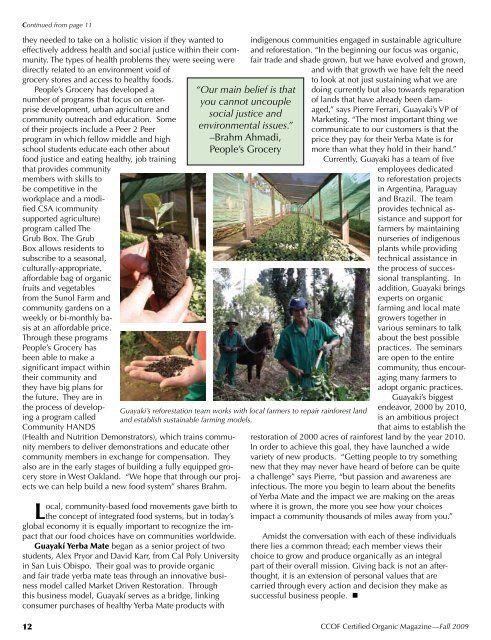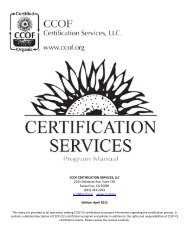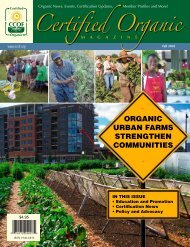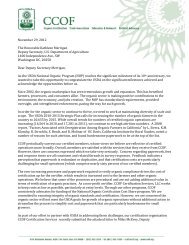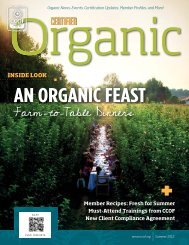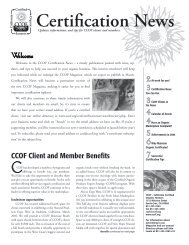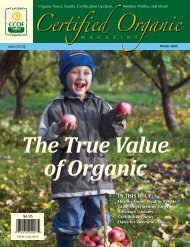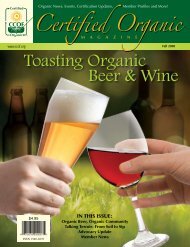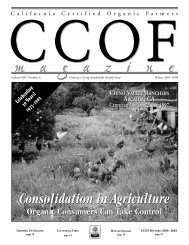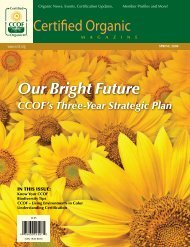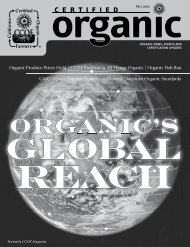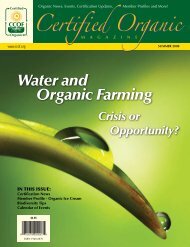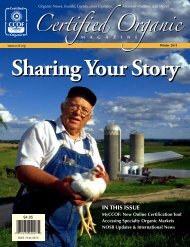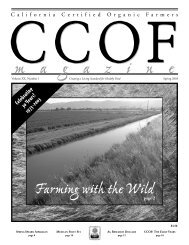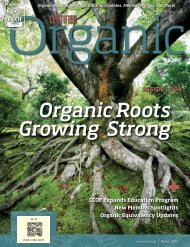Organic Gives Back - CCOF
Organic Gives Back - CCOF
Organic Gives Back - CCOF
- No tags were found...
You also want an ePaper? Increase the reach of your titles
YUMPU automatically turns print PDFs into web optimized ePapers that Google loves.
Continued from page 11they needed to take on a holistic vision if they wanted toeffectively address health and social justice within their community.The types of health problems they were seeing weredirectly related to an environment void ofgrocery stores and access to healthy foods.People’s Grocery has developed anumber of programs that focus on enterprisedevelopment, urban agriculture andcommunity outreach and education. Someof their projects include a Peer 2 Peerprogram in which fellow middle and highschool students educate each other aboutfood justice and eating healthy, job trainingthat provides communitymembers with skills tobe competitive in theworkplace and a modifiedCSA (communitysupported agriculture)program called TheGrub Box. The GrubBox allows residents tosubscribe to a seasonal,culturally-appropriate,affordable bag of organicfruits and vegetablesfrom the Sunol Farm andcommunity gardens on aweekly or bi-monthly basisat an affordable price.Through these programsPeople’s Grocery hasbeen able to make asignificant impact withintheir community andthey have big plans forthe future. They are inthe process of developinga program calledCommunity HANDS(Health and Nutrition Demonstrators), which trains communitymembers to deliver demonstrations and educate othercommunity members in exchange for compensation. Theyalso are in the early stages of building a fully equipped grocerystore in West Oakland. “We hope that through our projectswe can help build a new food system” shares Brahm.Local, community-based food movements gave birth tothe concept of integrated food systems, but in today’sglobal economy it is equally important to recognize the impactthat our food choices have on communities worldwide.Guayakí Yerba Mate began as a senior project of twostudents, Alex Pryor and David Karr, from Cal Poly Universityin San Luis Obispo. Their goal was to provide organicand fair trade yerba mate teas through an innovative businessmodel called Market Driven Restoration. Throughthis business model, Guayakí serves as a bridge, linkingconsumer purchases of healthy Yerba Mate products with“Our main belief is thatyou cannot uncouplesocial justice andenvironmental issues.”–Brahm Ahmadi,People’s Groceryindigenous communities engaged in sustainable agricultureand reforestation. “In the beginning our focus was organic,fair trade and shade grown, but we have evolved and grown,and with that growth we have felt the needto look at not just sustaining what we aredoing currently but also towards reparationof lands that have already been damaged,”says Pierre Ferrari, Guayaki’s VP ofMarketing. “The most important thing wecommunicate to our customers is that theprice they pay for their Yerba Mate is formore than what they hold in their hand.”Currently, Guayaki has a team of fiveemployees dedicatedto reforestation projectsin Argentina, Paraguayand Brazil. The teamprovides technical assistanceand support forfarmers by maintainingnurseries of indigenousplants while providingtechnical assistance inthe process of successionaltransplanting. Inaddition, Guayaki bringsexperts on organicfarming and local mategrowers together invarious seminars to talkabout the best possiblepractices. The seminarsare open to the entirecommunity, thus encouragingmany farmers toadopt organic practices.Guayaki’s biggestendeavor, 2000 by 2010,is an ambitious projectthat aims to establish therestoration of 2000 acres of rainforest land by the year 2010.In order to achieve this goal, they have launched a widevariety of new products. “Getting people to try somethingnew that they may never have heard of before can be quitea challenge” says Pierre, “but passion and awareness areinfectious. The more you begin to learn about the benefitsof Yerba Mate and the impact we are making on the areaswhere it is grown, the more you see how your choicesimpact a community thousands of miles away from you.”Guayaki’s reforestation team works with local farmers to repair rainforest landand establish sustainable farming models.Amidst the conversation with each of these individualsthere lies a common thread; each member views theirchoice to grow and produce organically as an integralpart of their overall mission. Giving back is not an afterthought,it is an extension of personal values that arecarried through every action and decision they make assuccessful business people. •12 <strong>CCOF</strong> Certified <strong>Organic</strong> Magazine—Fall 2009


